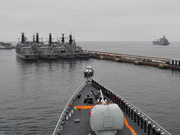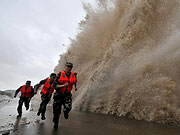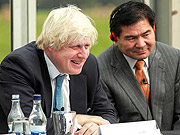OSLO, Oct. 11 -- The Organization for the Prohibition of Chemical Weapons (OPCW)has been awarded the 2013 Nobel peace prize "for its extensive efforts to eliminate chemical weapons."
Announcing the decision on Friday, Thorbjoern Jagland, chairman of the Norwegian Nobel Committee, said that since its coming into being in 1997, the OPCW, which is based in The Hague, the Netherlands, has sought to implement the 1992-93 convention for the prohibition of production, storage and use of chemical weapons.
The chemical attack in Syria months back was cited by the the Nobel Committee as the most recent incident of chemical weapons being put to use, which highlights "the need to enhance the efforts to do away with such weapons."
In a statement read out by Jagland at the packed press conference, the United States and Russia, in particular, were singled out as the states which have failed to observe the April 2012 deadline for destroying chemical weapons.
"It is natural that we now come back to the topic of disarmament and arms control" and the OPCW was on the table from the very beginning when the committee considered this year's winner, said Jagland.
Chemical weapons were used significantly in the First World War, resulting in the Geneva Convention in 1925 banning the use but not the production and storage of chemical weapons, said the statement issued by the Norwegian Nobel Committee.
During The Second World War, chemical agents were used extensively in the Nazi concentration camps in Europe to kill captives. Later, chemical weapons have been used several times by both states and terrorists .
The OPCW currently with 189 members is an international organization tasked with implementing the 1992-93 convention for the prohibition of chemical weapons. It entered into force in 1997.
Since mid-August this year, the OPCW has been in Syria making efforts to destroying chemical weapons.
The OPCW has become an important instrument for resolving the crisis in Syria and "we see here how a multilateral framework and a multilateral organization appears to be a good, perhaps the only instrument to resolve an international crisis," said Jagland.
Norwegian lawyer Fredrik S. Heffermehl, one of the strong critics in Norway to the Norwegian Nobel Committee, described as "a half-hearted tribute to (Alfred) Nobel" the Nobel peace prize for the OPCW, which was seen by many as the least controversial in comparison with the prize decisions over the past four years.
Admitting that the Norwegian Nobel Committee is correct in stating that disarmament figures prominently in Alfred Nobel's testament, Heffermehl asked: Why does the committee always hide that what Nobel wished to support was a great plan for abolition of all weapons in all countries.
"The committee's best kept secret is that Nobel wished to demilitarize international relations, not only civilize war but abolish it, " said the Norwegian lawyer.
The 2013 Nobel peace prize falls into a pattern where Norwegian politicians misuse the prize "to honor fellow statesmen and serve Western official policies or dissidents in non-Western countries," said Heffermehl.
Thorbjorn Jagland, who was a former Norwegian prime minister and foreign minister, has used the prize "to pat the back" of U.S. President Barack Obama in 2009 and this year, the Norwegian Nobel Committee is "helpful once again with its prize to the OPCW" as the United States has been confronting Syria, said the Norwegian lawyer.
 |

 Chinese Navy's taskforce arrives at Valparaiso of Chile for visit
Chinese Navy's taskforce arrives at Valparaiso of Chile for visit Serena Williams stumbles through to China Open quarterfinals
Serena Williams stumbles through to China Open quarterfinals Israeli drone crashes into Mediterranean, fragments recovered
Israeli drone crashes into Mediterranean, fragments recovered Typhoon Fitow approaches China
Typhoon Fitow approaches China Chinese tycoon aims to restore London's Crystal Palace
Chinese tycoon aims to restore London's Crystal Palace A southern staple
A southern staple Host city Beijing gears up for 2014 APEC summit
Host city Beijing gears up for 2014 APEC summit Disney's new heights
Disney's new heights
Day|Week|Month